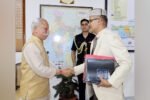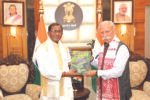HT Correspondent
ITANAGAR, June 24: In a significant step towards addressing the unique challenges of the Himalayan region, the Governor of Arunachal Pradesh, Lt General KT Parnaik, PVSM, UYSM, YSM (Retd), inaugurated the much-anticipated ‘HIM SAMWAAD 2025’ on June 23 at the Golden Jubilee Banquet Hall in Niti Vihar, Itanagar.
The three-day national dialogue, which brings together experts, policymakers, civil society representatives, and community leaders, aims to deliberate on pressing social, environmental, and policy concerns confronting the Himalayan belt.
According to an official statement, the Governor, in his keynote address, highlighted the urgent need for collaborative, inclusive, and sustainable action across all sectors.
“The path forward lies in meaningful collaboration between governments, academic institutions, civil society, and most importantly, local communities,” he said, setting the tone for the conference.
Lt Gen Parnaik emphasised that the dialogue is not just a discussion forum but a launch pad for tangible action — especially in sectors like clean water access, public health infrastructure, and ecological resilience.
He praised the organizing partners, including Sewa International, RIWATCH (Research Institute of World’s Ancient Traditions, Cultures and Heritage), the State Government, and several environment-conscious NGOs, for bringing together diverse voices on a shared platform.
This year’s HIM SAMWAAD places a focused lens on two fundamental and interlinked issues—Health and Water—described by the Governor as “pillars of mountain life.”
He noted that clean water in the fragile Himalayan ecosystem goes beyond daily utility; it is a matter of health, survival, and resilience.
The looming threats of climate change, glacial retreat, and degradation of traditional water sources, he warned, are directly impacting communities across the Himalayas.
The Governor called HIM SAMWAAD a “timely and necessary convergence” of stakeholders to develop community-led, sustainable solutions in water conservation, hygiene, and healthcare.
The initiative aligns with Sustainable Development Goal 3 (Good Health and Well-being) and SDG 6 (Clean Water and Sanitation), both of which are critical to the well-being and future security of the Himalayan people.
In a notable announcement, Governor Parnaik lauded Arunachal Pradesh’s recent achievement in becoming the first Northeastern state — and the 10th in India — to achieve 100% saturation under the ‘Har Ghar Jal’ mission, ensuring functional tap water connections to every household.
However, he clarified that this milestone is only the beginning, emphasizing the next phase: ensuring safe and adequate water supply to every healthcare facility, from rural clinics to tertiary hospitals.
Addressing the importance of cultural and ecological wisdom, the Governor stressed that the region’s indigenous traditions hold keys to sustainable development.
“Traditional healing practices, community-led water conservation methods, and local agricultural systems offer time-tested solutions that are both rooted and relevant,” he said, praising initiatives like the State Biodiversity Action Plan for integrating such wisdom into scientific policy frameworks.
Speaking about the people of Arunachal Pradesh, the Governor described them as the “heart and soul of the state,” whose rich cultural diversity and close bond with nature provide valuable lessons in resilience and sustainability.
He cited major ongoing initiatives under the leadership of Chief Minister Pema Khandu — including the Pakke Declaration, the ban on single-use plastics, Sewa Aapke Dwar, and innovations such as the Anti-Drug App and GIS-based Terrain Mapping — as indicators of Arunachal’s commitment to a green and inclusive development model.
The Governor also drew attention to the unique challenges in border areas, where many Vibrant Villages are located within 20–40 km of international borders.
He emphasised the need for strategic, ecologically sensitive, and people-first development, and called for coordinated efforts between the state, Centre, and armed forces.
A joint initiative involving the Indian Army and paramilitary forces is currently being planned to enhance infrastructure and security in these sensitive regions, he revealed.
On the international front, the Governor underscored the importance of diplomatic and transparent cooperation in managing shared water resources. He advocated for mechanisms that foster trust and mutual respect among neighboring countries, especially in the context of rivers and glacial systems that cross borders.
Looking to the future, the Governor called for greater awareness, research, and preservation of indigenous knowledge systems, especially in areas like health, agriculture, and water management.
He underscored the importance of documenting oral traditions and community practices, which are at risk of fading, and identified institutions like the Tribal Research Centre at Rajiv Gandhi University and a planned centre at Arunachal Pradesh University, Pasighat, as critical to this endeavor.
Prominent dignitaries present at the inaugural session included Shyam Parande, General Secretary and Global Coordinator of Sewa International; Swami Vedasarananda, Secretary Maharaj of Ramakrishna Mission Hospital, Itanagar; Prof Anil Kaul, Acting Vice Chancellor of the Indian Institute of Public Health, Hyderabad; Dr Emi Rumi, President of the Indigenous Faith and Cultural Society of Arunachal Pradesh; and Vijay Swami, Executive Director of RIWATCH.
Delegates and participants have gathered from across the Himalayan states, underlining the pan-regional significance of HIM SAMWAAD 2025.
As discussions and working groups progress over the next two days, the hope is that this collective platform will drive actionable outcomes and deepen cooperation across borders, disciplines, and communities.












